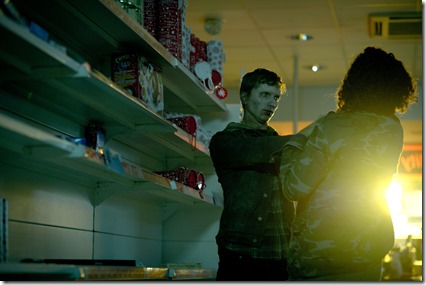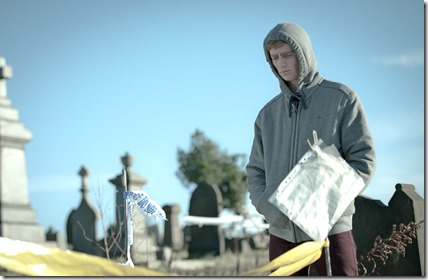In the Flesh (BBC America, Thursday-Saturday, 10/9C) does something no other zombie movie or series has done – it not only postulates a viral cause for zombies but also provides a situation in which an effective treatment has been found and looks at what kind of situations that might create. It is, by turns, effectively creepy and poignant – and not necessarily for the reasons you might expect.
The BBC America event series follows Kieren Walker (Luke Newberry), a sufferer of Partially Deceased Syndrome who has been treated and is being returned to his home in the out-of-the-way town of Roarton. He is not particularly happy about this for two reasons: a) he committed suicide, and b) he is haunted by his actions before he was found and treated.
The people of Roarton aren’t terribly keen about the possible of treated undead – whom they refer to as rotters. The village was mostly left to its own devices during the worst of the epidemic and had to rely on a government sanctioned local militia to look after its citizens.
The local vicar (Kenneth Cranham) preaches that the PDS sufferers are demons to be killed on sight – even (especially) if they’re treated. Bill Macy (Steve Evets), the leader of the militia, lost his son, Rick (David Walmsley), before the epidemic and faces a crisis of faith and ethics when he returns.
On the other hand, Kieren’s parents (Steve cooper, Marie Critchley) are just glad to have him back – even if they have to try to keep that on the down low (and, hey, small town – so you know how well that’s going to go). Kieren’s sister, Jem (Harriet Cains), on the other hand, spent time with the militia and has a totally different reaction. Then there’s Kieren’s connection to Rick…
In short, like the best zombie movies and series, In the Flesh is about people and behavior – even if some of those people aren’t actually alive in the conventional sense.
Series creator/writer Dominic Mitchell and director Jonny Campbell have put together a tale that lingers in the mind for some time afterward. Here, the real creepiness comes from some of the living – the series can be seen as a metaphor for all sorts of things, from AIDS to the latest supervirus and the purity of the untreated PDS sufferers who do what they need to do to survive without any malice or prejudice.
At its heart, though, it’s a tale of two families affected by tragedy and the different ways they are affected by it – the way they can either come together or be split apart – and by the humanity, or lack of same, in good old Homo sapiens.
In the Flesh has a few good scares, a number of genuinely creepy moments and at least as many poignant ones. It takes a horror subgenre and finds new nuances to it and communicates them well. It is as valid – and as good – as The Walking Dead at its best.
Final Grade: A
Photos by Des Willie/Courtesy of BBC America

